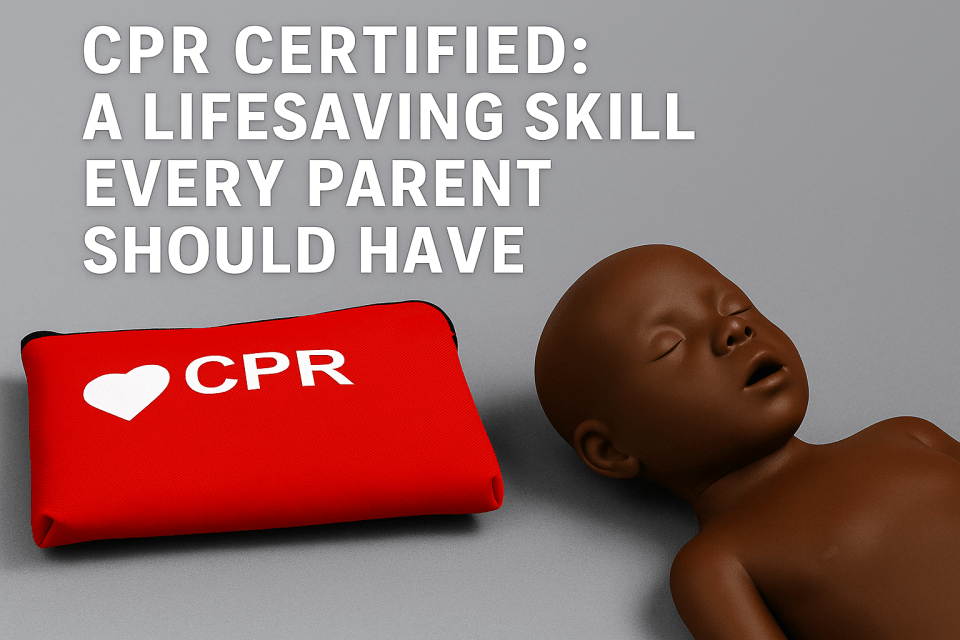The Importance of CPR Certification for Parents
As a parent, your children’s safety is your top priority. While you can’t always control every situation, you can take proactive steps to ensure you’re prepared if an emergency arises. One such step is obtaining CPR certification. Being CPR certified means that in the event of an emergency—whether it’s choking, drowning, or a sudden medical crisis—you can confidently step in and provide immediate assistance until medical professionals arrive. This crucial skill not only helps protect your own children, but it also equips you to assist other families, whether you’re at a family gathering or in a community setting. CPR training can make the difference between life and death, and every parent should consider it.

The Benefits of CPR Certification for Parents
CPR certification is more than just a skill—it’s a life-saving tool that can be applied in countless scenarios. Here’s why it’s particularly valuable for parents:
1. Immediate Response in Critical Situations
As a parent, you never know when an emergency might occur. Whether it’s your baby swallowing something they shouldn’t or someone experiencing a sudden heart attack, being CPR certified ensures that you’re prepared to act immediately. Knowing how to perform chest compressions or rescue breathing can stabilize someone long enough for professional medical help to arrive, buying precious time in life-threatening situations.
2. Confidence in High-Pressure Moments
One of the greatest benefits of CPR certification is the confidence it provides. Emergencies are inherently stressful, and the natural response is often panic. However, having CPR training equips you with the skills to remain calm, assess the situation, and act quickly. This confidence is not just helpful for you as a parent but can also bring peace of mind to your children and those around you.
3. Peace of Mind for Parents and Families
The mere knowledge that you are prepared for an emergency situation can be incredibly comforting. Whether you’re at home, at the park, or at a family gathering, CPR certification ensures that you’re not only looking out for your own children but can also assist others in the community. You become a valuable asset in any setting, giving you the peace of mind to enjoy daily life without worrying about whether you could respond in an emergency.
When CPR Certification Becomes Crucial for Parents
While CPR is a critical skill at any time, it is especially important during certain situations involving children:
- Choking Incidents: Children are naturally curious and often put small objects in their mouths. If they begin choking, the ability to perform the Heimlich maneuver can save a life.
- Drowning Accidents: Pools, lakes, and even bathtubs can be hazardous, and young children are especially at risk. CPR certification teaches you how to handle drowning situations and can keep a child alive long enough to receive proper medical attention.
- Health Emergencies: From asthma attacks to seizures, CPR training ensures that you know how to handle various medical emergencies that may arise, particularly if your child has known health issues.
- Household Accidents: Minor accidents at home, such as burns, falls, or injuries from sharp objects, are common. Knowing how to administer First Aid or CPR during these incidents can prevent further injury and make the difference in recovery time.
What Does CPR Training Involve?
CPR training isn’t just about memorizing techniques; it’s about being able to act quickly and effectively when the need arises. Here’s what you can expect from CPR certification courses:
1. Learning Basic Life Support (BLS) Skills
CPR courses teach you how to perform chest compressions and rescue breaths on both adults and children. In the event of a cardiac emergency, these skills are crucial for keeping blood circulating to vital organs, particularly the brain and heart.
2. Recognizing the Signs of Cardiac Arrest or Choking
CPR training includes education on recognizing signs of medical emergencies. Knowing how to identify the symptoms of choking or cardiac arrest allows you to respond without hesitation.
3. AED (Automated External Defibrillator) Training
Some CPR courses also include training on the use of an AED. This device is commonly found in public spaces, and knowing how to use it could mean the difference between life and death in the event of a cardiac arrest.
4. First Aid Basics
Many CPR courses also cover basic first aid techniques, such as bandaging wounds, treating burns, or managing a sprain. These skills are useful for any parent, as children tend to injure themselves in all kinds of ways during everyday activities.
How CPR Certification Benefits Your Family and Community
While being CPR certified is an essential skill for parents, the benefits extend beyond the household:
- Community Contribution: You don’t just gain confidence in your ability to respond; you also contribute to the safety of the community. Whether at a public event or a family reunion, being CPR certified means you’re ready to step in and assist others in need.
- Improved Health and Safety in the Home: Being certified in CPR and first aid equips you with the tools to handle a variety of situations in the home, making it a safer place for everyone.
- Setting an Example for Your Children: Having CPR certification sets a strong example for your children. It shows them that safety and preparedness are values to uphold, and it teaches them the importance of knowing how to help others.
Conclusion: A Life-Saving Skill for Every Parent
Becoming CPR certified is an invaluable investment in your family’s safety. It’s not just about knowing the right steps to take in a crisis—it’s about empowering yourself with the skills and knowledge to keep your loved ones safe. As a parent, having the ability to act swiftly and confidently in an emergency can mean the difference between life and death. Equip yourself with this essential skill and bring peace of mind to your family, knowing that you are ready for whatever life throws your way.
comments +